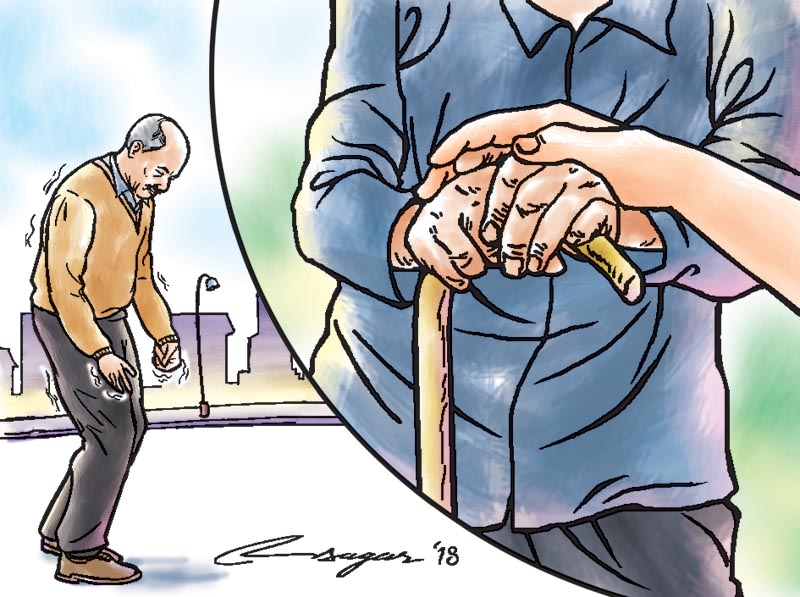Parkinson’s disease: Awareness is the key
Most people who have Parkinson’s live a normal to nearly normal life, but the disease can be life changing. For some people, treatment keeps the symptoms at bay, and they’re mostly mild while for others, the disease is much more serious
Parkinson’s disease is an illness that affects the part of the brain which controls the movement of our body. It can come on so slowly that we don’t even notice it at first. But over time, what starts as a little shakiness in our hand can have an impact on how we walk, talk, sleep and think. In the past, it used to be considered an old-age disease but nowadays more and more young people are being diagnosed with the condition.
There’s no cure for Parkinson’s disease, but we can get treatment and support to help manage the symptoms. The common symptoms of Parkinson’s are: slowness, rigidity, unbalanced body and tremors.
Deep down in brain, there’s an area called the substantia nigra. Some of its cells make dopamine, a chemical that carries messages around the brain. When we have Parkinson’s, the cells of the substantia nigra start to die. So, our dopamine levels drop and we can’t fire off as many messages to control our body. Early on, we won’t notice anything different. But as more and more cells die, we reach a tipping point where we start to have symptoms. That may not be until 80 per cent of the cells are gone, which is why we can have Parkinson’s for quite a while before we realise it.
Doctors aren’t sure why all those brain cells start dying. They think it’s a mix of our genes and something in the environment, but the reason is not straightforward. Someone could have a change in a gene tied to Parkinson’s, but never get the disease. That happens a lot. And a bunch of people could work side by side in a place with chemicals linked to Parkinson’s, but only a few of them end up with it.
There’s no one test for Parkinson’s. A lot of it is based on the symptoms and health history, but it could take some time to figure it out. And part of the process is ruling out other conditions that look like Parkinson’s. That’s one reason it’s important to go to a doctor who knows a lot about it. The treatment for Parkinson’s is all about managing symptoms. Drugs for Parkinson’s can often help with tremors, stiff muscles and slow movements. In some cases, surgery might be needed.
Deep brain stimulation (DBS) is a treatment for symptoms of Parkinson’s disease, including tremors, stiffness and trouble walking. It can also treat side effects of Parkinson’s medicines. DBS isn’t a cure for Parkinson’s and won’t stop it from getting worse. But it may be an option if you’ve had the disease at least five years and don’t get enough relief from medicine. For some people, DBS is life-changing. For others, the results aren’t as good.
Most people who have Parkinson’s live a normal to a nearly normal lifespan, but the disease can be life changing. For some people, treatment keeps the symptoms at bay, and they’re mostly mild. For others, the disease is much more serious. As it gets worse, it makes it harder and harder to do daily activities like getting out of bed, driving or going to work. Even writing can seem like a tough task. And in later stages, it can cause dementia.
Nepal lacks proper data on Parkinson’s disease diagnosis. No research for collecting data has been carried out yet. According to Dr Baburam Pokhrel, a neurologist at Mediciti Hospital, four-five patients are diagnosed with Parkinson’s disease each day by him. Similarly, Dr Pankaj Jalan, also a neurologist at Norvic International Hospital, says number of people diagnosed with Parkinson’s disease has increased in recent days.
Though a neuro-related disease, Parkinson’s affects a person so badly that s/he becomes invisibly disable. The government of Nepal recognises Parkinson’s disease as a fourth degree disability. The government has also introduced a provision to reimburse medical expenses up to Rs 100,000 each to patients through hospitals that have been listed with the government for the programme.
But unfortunately, only a handful of patients have been able to benefit from this government programme. Only a few hospitals have been listed with the government for the programme, and secondly, those which are listed are not providing the service properly.
To get the government support, a patient must present his/ her diagnosis prescription, recommendation from the respective ward, copy of citizenship certificate to the District Health Office, which then sends the recommendation to the hospital. After that the hospital would provide free treatment up to Rs 100,000 to the patient.
A non- profit organisation named Parkinson’s Nepal has recently been registered for raising awareness about the disease. Parkinson Nepal has already done a lot of programs related to awareness. April was Parkinson’s awareness month. Like in other parts of the world, Parkinson Nepal also organised the Run for Parkinson’s, a five-kilometre run for raising awareness about the disease.
Actor Madan Krishna Shrestha, a patient himself, is also on the advisory board of this organisation. Parkinson Nepal has also made a documentary “Living with Parkinson’s” which has the story of four patients including Shrestha’s.
A lot still more needs to be done to raise awareness about Parkinson’s disease in Nepal. There is also a need of attitudinal change among the members of the society when it comes to the disease. Parkinson’s patients need support and care; they should not be made an object of neglect.
Khanal is founder of Parkinson’s Nepal






